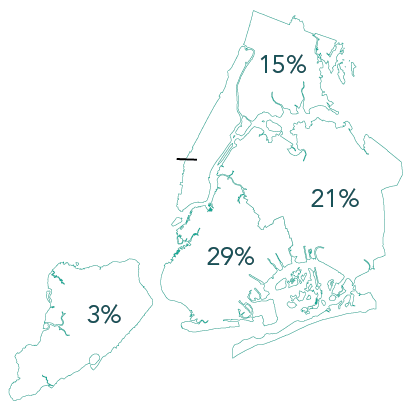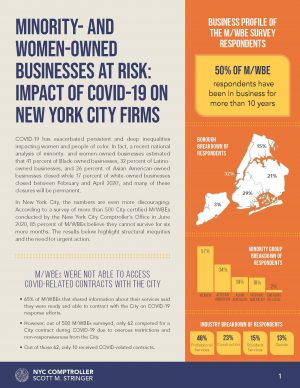Introduction
COVID-19 has exacerbated persistent and deep inequalities impacting women and people of color. In fact, a recent national analysis of minority- and women-owned businesses estimated that between February and April 2020, 41 percent of Black-owned businesses, 32 percent of Latino- owned businesses, and 26 percent of Asian American-owned businesses closed either temporarily or permanently, while 17 percent of white-owned businesses closed.i
In New York City, the numbers are even more discouraging. According to a survey of more than 500 City-certified M/WBEs conducted by the New York City Comptroller’s Office in June 2020, 85 percent of M/WBEs believe they cannot survive for six more months. The results below highlight structural inequities and the need for urgent action.
Business profile of the M/WBE survey respondents
50% of M/WBE
respondents have been in business for more than 10 years
Borough Breakdown of Respondents

Minority Group Breakdown of Respondents
Chart 1
Industry Breakdown of Respondents
48%
Professional Services
23%
Construction
15%
Standard Services
13%
Goods
Did City-certified M/WBEs get relief from the federal Economic Injury Disaster Loan?
Chart 2
Did City-certified M/WBEs get relief from the federal Paycheck Protection Program?
Chart 3
Chart 4
M/WBEs Were Not Able to Access COVID-related Contracts With the City
- 65% of M/WBEs that shared information about their services said they were ready and able to contract with the City on COVID-19 response efforts.
- However, out of 500 M/WBEs surveyed, only 62 competed for a City contract during COVID-19 due to onerous restrictions and non-responsiveness from the City.
- Out of those 62, only 10 received COVID-related contracts.
M/WBEs Face Barriers to Federal, City, and Private Sector Relief
- 25% of M/WBEs did not apply for federal or City funding for the following reasons:
- Restrictive application criteria or use of funds
- M/WBEs did not want to be subject to debt or high interest rates
- Lack of outreach and awareness
- Funds were exhausted before they applied
- 20% of M/WBEs applied for federal or City funding but were not approved for the following reasons:
- Low credit score
- They did not meet application criteria
- They were still waiting approval
- They were rejected and were not told why they were ineligible
- Funds were exhausted before their application was processed
- Did M/WBEs get relief from the City of New York?
- Only 40 M/WBEs applied for the New York City Business Continuity Loan. Of the 40, only six were approved.
- Only 48 M/WBEs applied for the New York City Employee Retention Grant. Of the 48, only 15 were approved.
What M/WBEs want from the City of New York
Long Term Viability of M/WBEs in Question
30%
85%
80%
50%
35%
i National Bureau of Economic Research, https://www.nber.org/papers/w27309.pdf.
